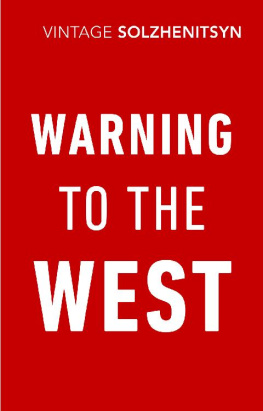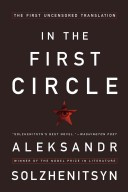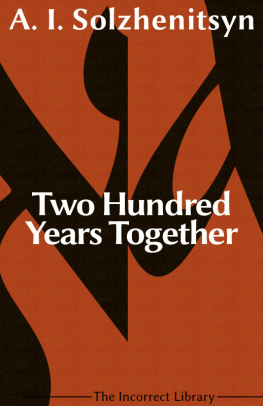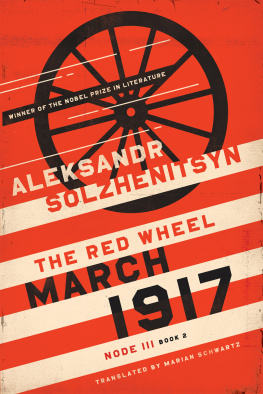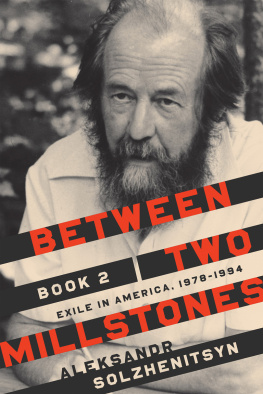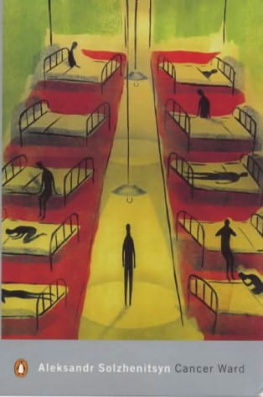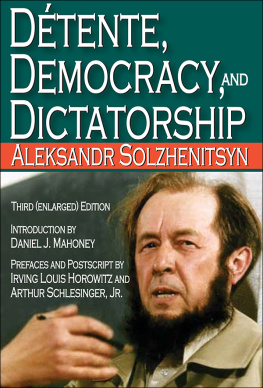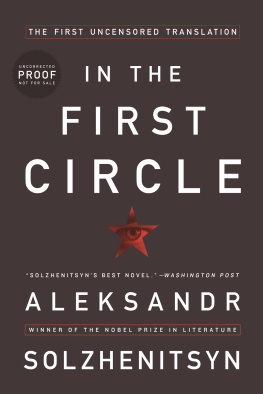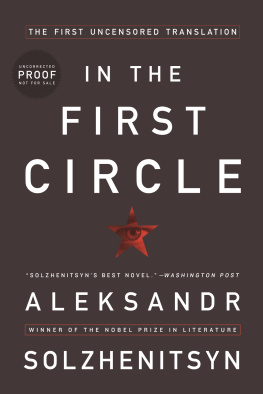Contents
ABOUT THE AUTHOR
Aleksandr Solzhenitsyn was born in 1918 and grew up in Rostov-on-Don. He graduated in physics and mathematics from Rostov University and studied literature by correspondence course at Moscow University. In World War Two he fought as an artillery officer, attaining the rank of captain. In 1945, however, after making derogatory remarks about Stalin in a letter, he was arrested and summarily sentenced to eight years in forced-labour camps, followed by internal exile. In 1957 he was formally rehabilitated, and settled down to teaching and writing, in Ryazan and Moscow. The publication of One Day in the Life of Ivan Denisovich in Novy Mir in 1962 was followed by the publication, in the West, of his novels Cancer Ward and The First Circle . In 1970 he was awarded the Nobel Prize for Literature, and in 1974 his citizenship was revoked and he was expelled from the Soviet Union. He eventually settled in Vermont, USA, and completed his great historical cycle The Red Wheel . In 1990, with the fall of Soviet Communism, his citizenship was restored, and four years later, he returned to settle in Russia. He died in 2008 near Moscow, at the age of eighty-nine.
ALSO BY ALEKSANDR SOLZHENITSYN
Novels
In the First Circle
Cancer Ward
The Red Wheel
Non-fiction
The Gulag Archipelago
The Oak and the Calf
Between Two Millstones
Stories & Poems
One Day in the Life of Ivan Denisovich
Matryonas Home
Miniatures (Prose Poems)
The Trail
Plays & Screenplays
Victory Celebrations
Prisoners
The Love-Girl and the Innocent
Candle in the Wind (The Light Which is in Thee)
Tanks Know the Truth
Essays & Speeches
One Word of Truth (Nobel Lecture)
A World Split Apart (Harvard Address)
Letter to the Soviet Leaders
Rebuilding Russia
The Russian Question at the End of the Twentieth Century
ALEXANDER SOLZHENITSYN
Warning to the West
Speeches, 1975-6
Speeches to the Americans
[ JUNE 30 , 1975]
I NTRODUCTION BY G EORGE M EANY
When we think of the historic struggles and conflicts of this century, we naturally think of famous leaders: men who governed nations , commanded armies , and inspired movements in the defense of liberty, or in the service of ideologies which have obliterated liberty .
Yet today, in this grave hour in human history , when the forces arrayed against the free spirit of man are more powerful, more brutal, and more lethal than ever before, the single figure who has raised highest the flame of liberty heads no state, commands no army, and leads no movement that our eyes can see .
But there is a movementa hidden movement of human beings who have no offices and no headquarters, who are not represented in the great halls where nations meet, who every day risk or suffer more for the right to speak, to think, and to be themselves than any of us here are likely to risk in our entire lifetime.
Where are the members of this invisible movement? As we prepare tonight to honor the presence of one of them among us, let us give some thought to the rest: to the millions who are trapped in Soviet slave-labor camps; to the countless thousands drugged and strait-jacketed in so-called insane asylums; to the multitudes of voiceless workers who slave in the factories of the commissars; to all those who strain for bits and pieces of truth through the jammed frequencies of forbidden broadcasts, and who record and pass outlawed thoughts from hand to hand in the shadows of tyranny.
But if they remain invisible to us, we can hear them now, for there has come forth from under the rubble of oppression a voice that demands to be heard, a voice that will not be denied.
We heed this voice, not because it speaks for the left or the right or for any faction, but because it hurls truth and courage into the teeth of total power when it would be so much easier and more comfortable to submit and to embrace the lies by which that power lives .
What is the strength of this voice? How has it broken through to us when others have been stilled? Its strength is art.
Alexander Solzhenitsyn is not a crusader. He is not a politician. He is not a general. He is an artist.
Solzhenitsyns art illuminates the truth. It is, in a sense, subversive: subversive of hypocrisy, subversive of delusion, subversive of the Big Lie .
No man in modern times and very few in all of history have demonstrated as drastically as Alexander Solzhenitsyn the power of the pen coupled with the courage to free mens minds .
We need that power desperately today. We need it to teach the new and the forgetful generations in our midst what it means not to be free. Freedom is not an abstraction; neither is the absence of freedom. Solzhenitsyn has helped us to see that, thanks to his art and his courage.
His art is a unique gift. It cannot be transmitted to another. But let us pray that his courage is contagious.
We need echoes of his voice. We need to hear the echoes in the White House. We need to hear the echoes in the Congress and in the State Department and in the universities and in the media, and if you please, Mr. Ambassador Patrick Moynihan, in the United Nations.
The American trade-union movement, from its beginnings to the present, has been dedicated to the firm, unyielding belief in freedom. Freedom for all mankind, as well as for ourselves. It is in that spirit that we are honored to present Alexander Solzhenitsyn.
MOST OF THOSE present here today are workers. Creative workers. And I myself, having spent many years of my life as a bricklayer, as a foundry-man, as a manual worker, in the name of all who have shared this forced labor with me, like the two Gulag prisoners whom you just saw, and on behalf of those who are doing forced labor in our country, I can start my speech today with the greeting: Brothers! Brothers in Labor!
And not to forget the many honored guests present here tonight, let me add: Ladies and gentlemen.
Workers of the world, unite! Who of us has not heard this slogan, which has been sounding through the world for 125 years? Today you can find it in any Soviet pamphlet as well as in every issue of Pravda. But never have the leaders of the Communist Revolution in the Soviet Union used these words sincerely and in their full meaning. When so many lies have accumulated over the decades, we forget the radical and basic lie which is not on the leaves of the tree but at its very roots.
It is now almost impossible to remember or to believe For instance, I recently reprinted a pamphlet from the year 1918. This was a detailed record of a meeting of all representatives of the factories in Petrograd, the city known in our country as the cradle of the Revolution.
I repeat, this was March 1918, only four months after the October Revolution, and all the representatives of the Petrograd factories were denouncing the Communists who had deceived them in all their promises. What is more, not only had the Communists abandoned Petrograd to cold and hunger, themselves having fled from Petrograd to Moscow, but they had given orders to open machine-gun fire on the crowds of workers in the factory courtyards who were demanding the election of independent factory committees.




